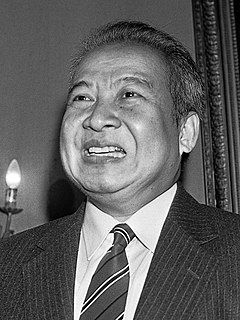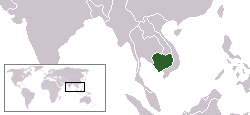Related Research Articles
The history of Cambodia, a country in mainland Southeast Asia, can be traced back to Indian civilization. Detailed records of a political structure on the territory of what is now Cambodia first appear in Chinese annals in reference to Funan, a polity that encompassed the southernmost part of the Indochinese peninsula during the 1st to 6th centuries. Centered at the lower Mekong, Funan is noted as the oldest regional Hindu culture, which suggests prolonged socio-economic interaction with maritime trading partners of the Indosphere in the west. By the 6th century a civilization, called Chenla or Zhenla in Chinese annals, firmly replaced Funan, as it controlled larger, more undulating areas of Indochina and maintained more than a singular centre of power.

Norodom Sihanouk was a Cambodian politician who led Cambodia in various capacities throughout his political career, but most often as the King of Cambodia. In Cambodia, he is known as Samdech Euv. During his lifetime, Cambodia was variously called the French Protectorate of Cambodia, the Kingdom of Cambodia (1953–1970), the Khmer Republic (1970–75), Democratic Kampuchea (1975–79), the People's Republic of Kampuchea (1979–93), and again the Kingdom of Cambodia.

Cambodia, officially the Kingdom of Cambodia, is a country located in the southern portion of the Indochinese Peninsula in Southeast Asia. It is 181,035 square kilometres in area, bordered by Thailand to the northwest, Laos to the north, Vietnam to the east and the Gulf of Thailand to the southwest. Phnom Penh is the nation's capital and largest city.

Kampong Speu is a province (khaet) of Cambodia. It borders the provinces of Pursat and Kampong Chhnang to the north, Kandal to the east, Takéo to the southeast, Kampot to the south and Koh Kong to the west. Its capital is Chbar Mon town.

Kampot Province is a province (khaet) in southwestern of Cambodia. It borders the provinces of Koh Kong and Kampong Speu to the north, Takeo and Kep and Vietnam to the east and Sihanoukville to the west. To its south it has a coastline of around 45 km on the Gulf of Thailand. It is rich in low arable lands and has abundant natural resources. Its capital is Kampot town.

Kratié, alternatively Kraches or Kracheh is a province (khaet) of Cambodia located in the northeast. It borders Stung Treng to the north, Mondulkiri to the east, Kampong Thom and Kampong Cham to the west, and Tbong Khmum and Vietnam to the south.

Ratanakiri or Ratanak Kiri, is a province of northeast Cambodia. It borders the provinces of Mondulkiri to the south and Stung Treng to the west and the countries of Laos and Vietnam to the north and east, respectively. The province extends from the mountains of the Annamite Range in the north, across a hilly plateau between the Tonlé San and Tonlé Srepok rivers, to tropical deciduous forests in the south. In recent years, logging and mining have scarred Ratanakiri's environment, long known for its beauty.

Khmer people are a Southeast Asian ethnic group and nation native to Cambodia, accounting for over 97% of the country's 15.9 million people. They speak the Khmer language, which is part of the larger Austroasiatic language family found in parts of Southeast Asia, parts of central, eastern, and north eastern India, parts of Bangladesh in South Asia, in parts of Southern China and numerous islands in the Indian Ocean.

Lesbian, gay, bisexual, and transgender (LGBT) persons in Cambodia face legal challenges not experienced by non-LGBT residents. Same-sex sexual activity is legal in Cambodia. While traditional cultural mores tend to be tolerant in this area, even expressly providing support for people of an intermediate or third gender, LGBT rights legislation has not yet been enacted by the ruling Cambodian People's Party.

Lyle's flying fox is a species of flying fox in the family Pteropodidae. It is found in Cambodia, Thailand and Vietnam, with an outlying population in Yunnan, China. It faces persecution from farmers and it is killed for bushmeat in parts of its range. The International Union for Conservation of Nature has rated its conservation status as being "vulnerable".
Buddhism is the official religion of Cambodia. Approximately 98% of Cambodia's population follows Theravada Buddhism, with Islam, Christianity, and tribal animism as well as Baha’i faith making up the bulk of the small remainder. The wat and Sangha (monkhood), together with essential Buddhist doctrines such as reincarnation and the accumulation of merit, are at the centre of religious life.

Cambodia–Denmark relations refers to the historical and current relationship of Cambodia and Denmark.
The Kuy are an indigenous ethnic group of mainland Southeast Asia. The native lands of the Kuy range from the southern Khorat Plateau in northeast Thailand east to the banks of the Mekong River in southern Laos and south to north central Cambodia. The Kuy are an ethnic minority in all three countries, where they live as "hill tribes" or Montagnards. Their language is classified as a Katuic language of the Mon-Khmer language family and, as such, is related to the Khmer language of Cambodia. The Thais, Lao, and Khmer traditionally recognize the Kuy as the aboriginal inhabitants of the region and refer to them as Khmer boran (Khmer), meaning "ancient Khmer" or Khamen pa dong. The word kuy in the Kuy language means "people" or "human being"; alternate English spellings include Kui, Kuoy and Kuay, while forms similar to "Suay" or "Suei" are derived from the Thai/Lao exonyms meaning "those who pay tribute". The Kuy are known as skilled mahouts, or elephant trainers, and many Kuy villages are employed in finding, taming, and selling elephants.
The Cambodian Confederation of Unions (CCU) is a national trade union centre in Cambodia. The centre is politically tied to the opposition Cambodia National Rescue Party (CNRP) and has been denied official recognition several times in the past. The Cambodian Independent Teachers' Association (CITA) and the Free Trade Union of Workers of the Kingdom of Cambodia (FTUWKC) are affiliated with the centre.
The Cambodian Industrial Food Union Federation (CIFUF) is a trade union federation of food, restaurant, tobacco and informal economy workers in Cambodia. The union was established in 2003 and represents 7,345 members in nine local unions. CIFUF is affiliated with CUNIC.
The Khmer Occupational Citizenship and Transportation Association (KOCTA) is a trade union of informal economy workers in Cambodia. The union was established in 2008 and claims to represent 575 members in nine branches. KOCTA is not affiliated with any trade union federation.
The Trade Union Federation Khmer Worker League (TUFKWL) is a trade union of garment workers in Cambodia. The union was established in 2010 and represents 1,589 members in three local unions. The leader of TUFKWL worked with TUFIKEL before establishing the new union. TUFKWL is affiliated with the Cambodia Confederation of Trade Unions.
The Federation of Building and Wood Workers (FBWW) is a trade union of mainly construction workers in Cambodia. The union was established in 2001 and represents 654 members. FBWW is affiliated with the Cambodia Confederation of Trade Unions. The union shares office space with the Cambodian Unions Federation, on which it also depends for financial support.
The Building and Wood Workers Trade Union Federation of Cambodia (BWTUC) is a trade union of mainly construction workers in Cambodia. The union was established in 2009 through a merger of two smaller unions and represents 2,250 members in ten local unions, among them restoration workers at Angkor Wat. BWTUC is affiliated with the Cambodian Confederation of Labour and has received funding from Building and Wood Workers International.
The Cambodian Labour Confederation (CLC) is a national trade union centre in Cambodia. The politically independent centre was formed by C.CAWDU in 2006.
References
- ↑ Labour Market Profile 2015. Cambodia (PDF) (Report). LO/FTF Council. 2015. p. 21.
- ↑ Vesna Nuon; Melisa Serrano (2010). Building Unions in Cambodia. History, Challenges, Strategies (PDF) (Report). Friedrich Ebert Foundation. p. 82. Retrieved 2021-01-26.